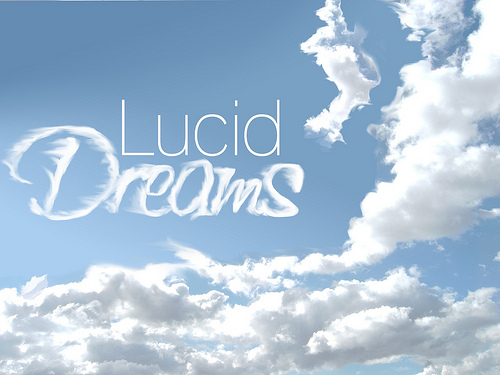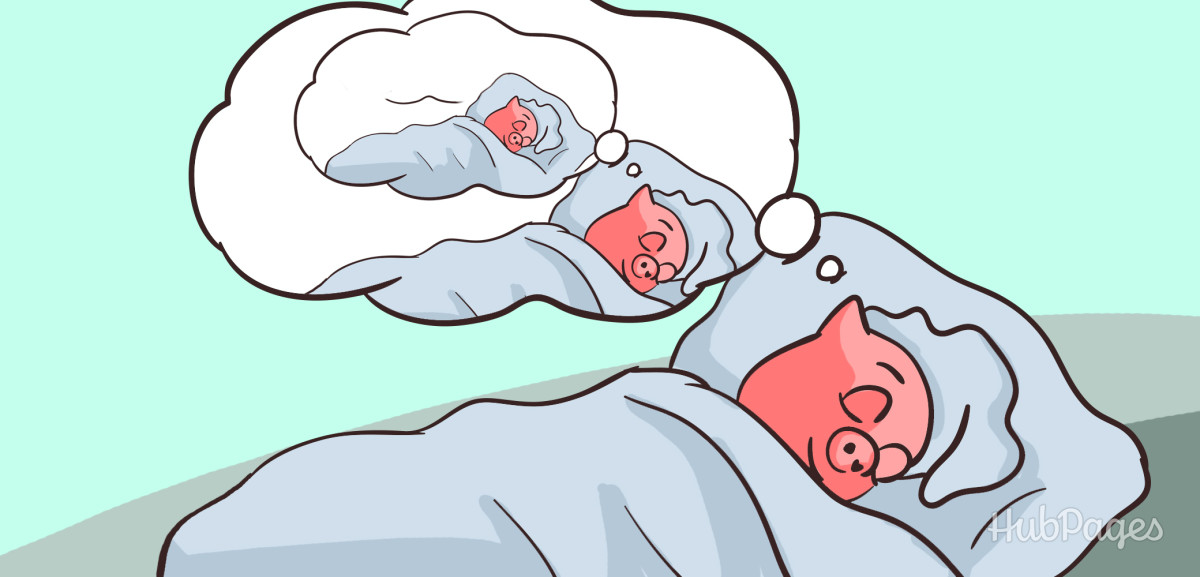Discovering Lucid Dreaming

What is Lucid Dreaming?
Lucid dreaming in a nutshell is when the dreamer sees themselves doing something impossible in the natural, like flying or leaping off a tall building. Once the dreamer recognises the feat is impossible in reality, they understand that this experience must be a dream. However, after coming to that realisation, the dreamer chooses to remain in the dream and if they don’t like the way the storyline is heading they can either change the dream or wake themselves up. The dreamer develops the ability to consciously direct and control their dreams. Lucid dreams are often extremely vivid where all of the dreamer’s senses come into play and everything they see, hear, feel, taste and even smell seems authentic.
In the normal dream state, self awareness is often quite limited. That's why many dreams often seem indistinct upon awakening. But when lucid dreaming, the conscious brain wakes up during sleep!
The general concept of lucid dreaming has been documented by different cultures throughout history. The French philosopher Rene Descartes found his lucid dreams so vivid, he concluded that our waking senses are illusory and not to be trusted!
The ancient Hebrews were able to interact and have sensible dialogue and immediately upon awakening understood any applications required from the nights dreaming.
Meanwhile, Tibetan Buddhist monks have incorporated heightened self-awareness and dream control on their path to enlightenment for around a thousand years. The concept of conscious dreaming is widely accepted in many Eastern cultures – with the West taking a little longer in modern times to recognise its validity.
Is there Scientific Evidence for Lucid Dreaming?
Dr Stephen LaBerge at Stanford University became famous for publishing an experiment using a volunteer in a lucid dream state communicating in real time with a series of preset eye movements in laboratory conditions in 1983. LaBerge then went on to found The Lucidity Institute and remains one of the leading lucid dream researchers to this day.
In 2009 a German study conducted at the Neurological Laboratory in Frankfurt revealed significantly increased brain activity during lucid dreams. An EEG machine recorded frequencies in the 40 Hz (or Gamma) range with lucid dreamers enjoying a bit of conscious REM. This is somewhat higher than the normal dream state (Theta range, or 4-8 Hz) and even more so than some folks awake state (Beta range, or 12-38 Hz). They also saw heightened activity in the frontal and frontolateral areas of the brain which are the seat of linguistic thought as well as other higher mental functions associated with self-awareness.
These experiments show us that Lucid dreaming enables us to remember waking commands and act willfully when conscious within the dream state and produce a highly active brainwave frequency not associated with regular dreaming or even normal waking awareness.
You do not have to be controlling every aspect of your dream to actually be lucid dreaming – there will be some things beyond your control but you will have heightened awareness and clarity of thought usually throughout the dream.

How do you know when you are Lucid Dreaming?
You may be sitting out in the sun drinking lemonade reading this hub, but at this moment in time you are aware of what you are doing. You are using your senses to build a clear and accurate picture of what you are doing and what your surroundings are like and this shows you that this is reality. At any point during the dream you may have that “aha” moment, when you recognise that you are dreaming. There may be several obvious signs but ultimately you know that it’s a dream simply because it is!
This same process will happen when you have a lucid dream. You may notice that something doesn’t appear to be quite right. Or you may see or hear something that isn’t as it should be. This will alert you and cause a heightened sense of self-awareness in the dream which will prompt you to question your reality and then verify that you are, in fact, dreaming. You will become conscious of your surroundings within the dream.
There are times when you may have a counterfeit or false awakening – where you feel that you have woken up and you believe that this is in fact your reality. This can cause you to go back into a loop where you will eventually realise that you are actually still only dreaming and go back into lucid dreaming - or completely wake up. These counterfeit awakenings can be somewhat disturbing but they are completely harmless!

Myths Related to Lucid Dreaming
Most of the myths surrounding lucid dreaming have stemmed from books and movies that have used the lucid dreaming concept as a theme or incorporated lucid dreaming into their plots. Lucid dreaming can be a difficult concept to grasp if you have never had a conscious dream before.
Inception is a brilliant movie and one which I have seen more than once, particularly because it is about Dreams, but it doesn’t make it reality and it does promote the idea that if you die in a dream-within-a-dream, you will remain in limbo land for years, your mind will deteriorate and this in turn will be carried over into your waking life. Just because you are conscious that you are dreaming does not mean that you will die when you wake up, this again has been an urban myth promoted by Hollywood.
Most people recognise the difference between movies books and reality, but below are some myths about lucid dreaming that have been spawned by Hollywood and authors and by others that simply don’t understand what they are talking about.
Lucid dreaming is not only for the New Age or alternate religions but everybody can do it. Simply by relaxing your mind prior to going to sleep and meditating or thinking on things from a positive perspective can actually help focus your attention. When you daydream or visualize i.e. use the incredible tool called your imagination to create scenarios just as children do, then you will be more likely to have a lucid dream.
You do not have to be highly trained to have lucid dreams. Because if that was the case, then I am not quite sure how I fit into the equation. There is no secret, and it is simply a process of becoming aware once you begin having lucid dreams. I have found that when I first became aware of lucid dreaming that I had little control but now, and especially when the dream is taking a negative turn I have a lot more control in my dreams. It does depend on what you think about and meditate on – if you constantly focus on dark things, then expect them to turn up in your dreams!

What Value Does Lucid Dreaming Have?
On a personal note - Having studied Dreams and Dream Interpretation for many years lucid dreaming has dramatically changed for me in the last few years. Whether this is connected to my maturity in years, my personal spiritual journey, my awareness of lucid dreaming or a mixture of all the above, I have found that I can alter some dreams whether it is isolated elements or occasionally the whole plot, especially if I really don't like the way things are heading.
Nightmares & Lucid Dreaming
In the main these would be any dark or false dreams where you recognise that the dreams may have been sent to distract you from moving with confidence into your future or bring fear - so instead of it turning out with you waking in a cold sweat shouting and waking the whole household, the ability to be able to "flip" these type of dreams is an incredible option and is actually possible for everyone to attain.
Creativity & Lucid Dreaming
Lucid dreams are also a really great source to find creativity and inspiration and there are many applications and examples of this where scientists or mathematicians have been able to solve problems, a musician has discovered his/her next hit song or an artist has envisioned his next masterpiece all while lucid dreaming and then in the morning has been able to write down or recreate what was seen the previous night.
The Impact Lucid Dreaming has in Reality
Having been on this journey of changing the way I perceive things about myself and others has most definitely had an impact in my dream life for the better and having spoken with thousands of other folk regarding their dreams, I have found that it is worth exploring the realm of Dreams and the impact that they can have in your daily life! We at Dreams have experienced many opportunities and doors opening from the practical applications we have discovered in both our ordinary dreams and from delving into lucid dreaming.
If you are interested in learning more about Dreams feel free to contact me on www.dreams.org.nz
Hope all your dreams are sweet ones!







